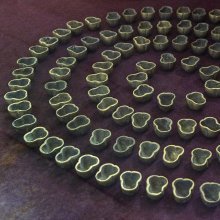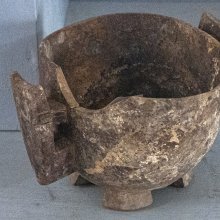Kapa: 10 definitions
Introduction:
Kapa means something in Hinduism, Sanskrit, Marathi. If you want to know the exact meaning, history, etymology or English translation of this term then check out the descriptions on this page. Add your comment or reference to a book if you want to contribute to this summary article.
Images (photo gallery)
In Hinduism
Purana and Itihasa (epic history)
Source: archive.org: Puranic EncyclopediaKapa (कप).—A company of Asuras. The Mahābhārata gives a story of how the brahmins killed these demons. The Aśvinīdevas once came to the earth and gave eyesight to the blind sage Cyavana. It was the time when Indra had denied Soma juice to the Aśvinīdevas. Sage Cyavana got back his eyesight and promised the Aśvinīdevas that he would lift the ban on wine for them. Cyavana conducted a Yāga to which the Aśvinīdevas were also invited. Indra and the other devas refused to take the sacrificial wine and butter along with the Aśvinīdevas. Cyavana got angry and he produced from the sacrificial fire an Asura named Mada. With a huge mouth and long teeth the demon went round eating all the Devas. All at once Cyavana conquered the earth and the Kapas subjugated heaven. When they lost both heaven and earth the Devas approached the brahmins for help. The brahmins started a war against the Kapas. The Kapas sent Dhani to the brahmins for peace-talks. Dhani said "The Kapas are equal to you, Oh brahmins, and so why do you fight them? They are well-versed in Vedas and are very wise men who are entitled to conduct Yāgas. They are righteous persons similar to Brahmarṣis. Prosperity lives in them. They never keep unchaste wives nor do they eat stale meat. It is not proper to fight against such virtuous persons."
But the brahmins did not pay heed to what Dhani said and they killed all the Kapas in bulk. The Kapas, though they were born Asuras, were good-natured persons. (Chapter 157, Anuśāsana Parva)

The Purana (पुराण, purāṇas) refers to Sanskrit literature preserving ancient India’s vast cultural history, including historical legends, religious ceremonies, various arts and sciences. The eighteen mahapuranas total over 400,000 shlokas (metrical couplets) and date to at least several centuries BCE.
Languages of India and abroad
Marathi-English dictionary
Source: DDSA: The Molesworth Marathi and English Dictionarykapa (कप).—m Cotton, the cotton-like substance around the bark of young suramāḍa trees, and other similar things used for kindling fire; tinder. The kapa of the suramāḍa is also a styptic.
--- OR ---
kapā (कपा).—m A piece of cloth; a fragment or remnant. 2 A patch. 3 A division or pocket (of a purse or bag). 4 The till of a box. 5 A large pulley-block or reeve-block.
--- OR ---
kāpa (काप).—m An ear-ornament of females. Pr. kāpa gēlē bhōkēṃ rāhilīṃ. 2 (kāpaṇēṃ) A slice (esp. of fruits and esculent roots). v kara, pāḍa, paḍa.
--- OR ---
kāpā (कापा).—a (kāpaṇēṃ. Opp. to barakā Oozy and flabby.) Hard and solid (so as to be cut and eaten);--used of fruits, of kinds of Jack, mango &c.
Source: DDSA: The Aryabhusan school dictionary, Marathi-Englishkapā (कपा) [-ppā, -प्पा].—m A piece of cloth. A patch. A pocket, division. The till of a box.
--- OR ---
kāpa (काप).—m An ear-ornament of females. kāpa gēlē bhōṅkēṃ rāhilīṃ To have only the vestiges of former glory or opulence left. f A slice.
--- OR ---
kāpā (कापा).—a Hard and solid.
Marathi is an Indo-European language having over 70 million native speakers people in (predominantly) Maharashtra India. Marathi, like many other Indo-Aryan languages, evolved from early forms of Prakrit, which itself is a subset of Sanskrit, one of the most ancient languages of the world.
Sanskrit dictionary
Source: DDSA: The practical Sanskrit-English dictionaryKapa (कप).—
1) Name of वरुण (varuṇa).
2) A class of demons; च्यवनेनं हृता भूमिः कपैश्चैव दिनं प्रभो (cyavanenaṃ hṛtā bhūmiḥ kapaiścaiva dinaṃ prabho) Mahābhārata (Bombay) 13.157.4.
Source: Cologne Digital Sanskrit Dictionaries: Benfey Sanskrit-English DictionaryKapa (कप).—m. The name of a kind of demons, Mahābhārata 13, 7329 sqq.
Source: Cologne Digital Sanskrit Dictionaries: Cappeller Sanskrit-English DictionaryKapa (कप).—[masculine] [plural] a cert. class of gods.
Source: Cologne Digital Sanskrit Dictionaries: Monier-Williams Sanskrit-English Dictionary1) Kapa (कप):—m. [plural] Name of a class of deities, [Mahābhārata]
2) Kāpā (कापा):—f. a carriage ([Grassmann]), [Ṛg-veda x, 40, 3.]
[Sanskrit to German]
Sanskrit, also spelled संस्कृतम् (saṃskṛtam), is an ancient language of India commonly seen as the grandmother of the Indo-European language family (even English!). Closely allied with Prakrit and Pali, Sanskrit is more exhaustive in both grammar and terms and has the most extensive collection of literature in the world, greatly surpassing its sister-languages Greek and Latin.
Kannada-English dictionary
Source: Alar: Kannada-English corpusKapa (ಕಪ):—[noun] the thick, stringy mucus secreted by the mucous glands of the respiratory tract and discharged from the throat, as during a cold; phlegm.
Kannada is a Dravidian language (as opposed to the Indo-European language family) mainly spoken in the southwestern region of India.
See also (Relevant definitions)
Starts with (+378): Kapa-gargu, Kapa-kapa, Kapa-kapaenal, Kapa-tsjakka, Kapaal-nuhounu, Kapaal-phodi, Kapaal-phuta-lata, Kapaase, Kapaase-kuro, Kapaca, Kapada, Kapada chettu, Kapadaankha, Kapadacopada, Kapadalatta, Kapadalepa, Kapadanem, Kapadanisa, Kapadanishi, Kapadanivisa.
Ends with (+9): Ajaikapa, Anekapa, Bhadrakapa, Bisokapa, Celukapa, Cikapa, Dagadakapa, Darikapa, Hyinkapa, Kapa-kapa, Kapakapa, Karakapa, Lokapa, Lucikapa, Mokkapa, Navamshakapa, Nishkapa, Nsikapa, Ochikapa, Osikapa.
Full-text (+33): Kapas, Dhanin, Kapakkattu, Kapa-kapa, Kapas-kapas, Kappa, Kapas bulan, Kapas-nu-jhada, Dev kapas, Kapas besar, Kapas hantu, Kapas hutan, Kapa-tsjakka, Kapas-ka-jhar, Pili kapas, Kapas-sanglai, Kapas sadeki, Yara kapas, Armakapala, Kapasa.
Relevant text
Search found 8 books and stories containing Kapa, Kapā, Kāpa, Kāpā; (plurals include: Kapas, Kapās, Kāpas, Kāpās). You can also click to the full overview containing English textual excerpts. Below are direct links for the most relevant articles:
Mahabharata (English) (by Kisari Mohan Ganguli)
Section CLVII < [Anusasanika Parva]
The history of Andhra country (1000 AD - 1500 AD) (by Yashoda Devi)
Part 1 - Manda I (A.D. 1114—1118) < [Chapter IV - The Kondapadumatis (A.D. 1100-1282)]
Introduction (Velanandu Choda dynasty) < [Chapter I - The Velanandu Chodas of Tsandavole (A.D. 1020-1286)]
Part 4 - Choda II (A.D. 1163—1180) < [Chapter I - The Velanandu Chodas of Tsandavole (A.D. 1020-1286)]
Heimskringla (by Snorri Sturlson)
Part 4 - Of Erling And Hakon < [Chapter XVI - Magnus Erlingson's Saga]
Part 7 - Fall Of King Hakon < [Chapter XVI - Magnus Erlingson's Saga]
Apadana commentary (Atthakatha) (by U Lu Pe Win)
Commentary on the Biography of the thera Upasena, the son of Vaṅganta < [Chapter 2 - Sīhāsaniyavagga (lion-throne section)]
The Skanda Purana (by G. V. Tagare)
Chapter 33 - The Greatness of the Liṅgas Installed by Kumāra < [Section 2 - Kaumārikā-khaṇḍa]
Yoga Vasistha [English], Volume 1-4 (by Vihari-Lala Mitra)
Chapter CXI - The flight of the soldiers on all sides < [Book VII - Nirvana prakarana part 2 (nirvana prakarana)]

